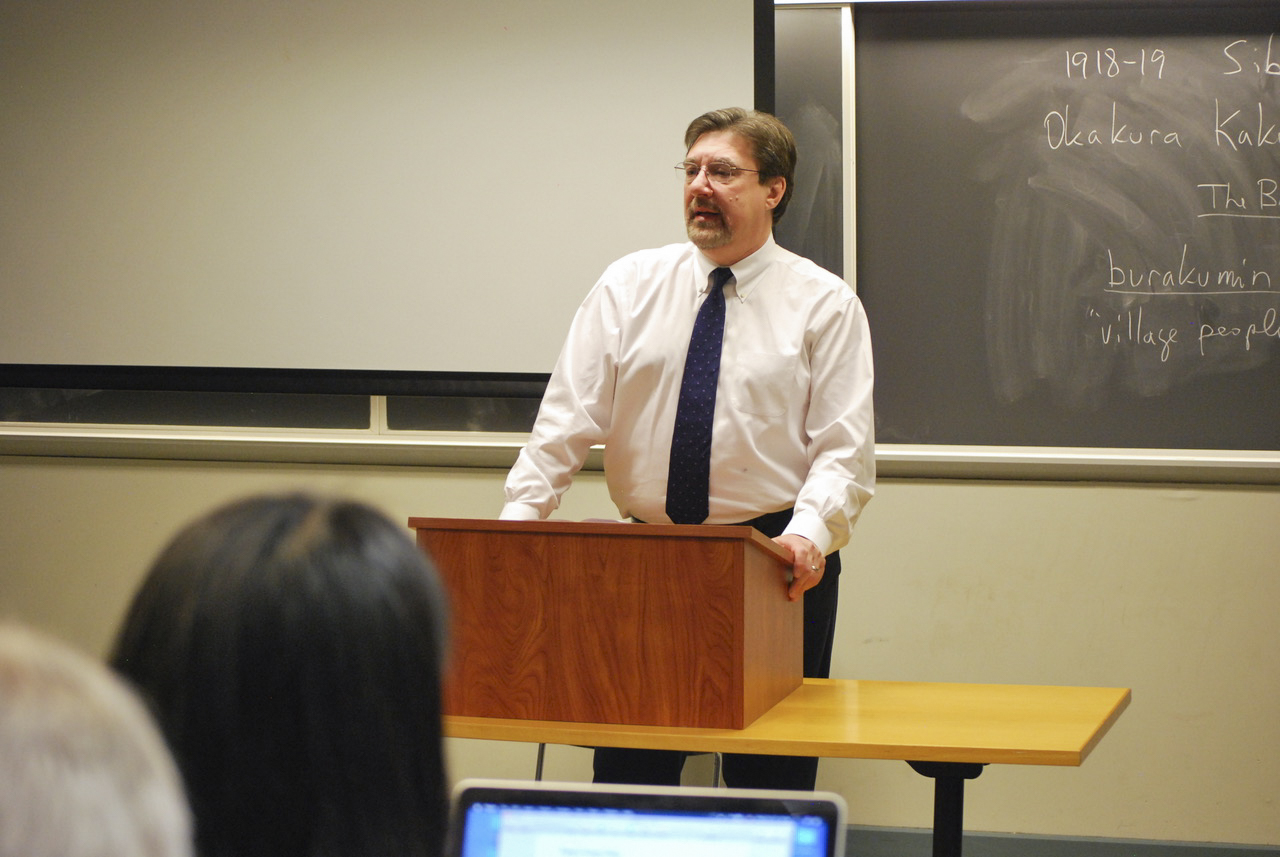
c/o Mason Mandell, Staff Writer
Professor and author Thomas Nichols visited campus on Wednesday for a lecture and book signing event titled “US Foreign Policy in the Age of Trump.” Nichols’ lecture revolved around the previous administration’s foreign policy, Russian interference in the 2016 election, and trends in domestic politics.
Nichols, a self-described “Never-Trumper” who voted for Hillary Clinton “with clenched teeth,” spoke outside his capacity as professor of national security affairs at the U.S. Naval War College to deliver critiques of the Trump administration.
“I’m going to begin by saying there is no Trump foreign policy,” Nichols said. “As far as I can tell, there is no emanating idea.”
With a weak president, Nichols found it best to examine the cabinet. But former chief strategist Steve Bannon’s ideology tells little.
“It’s hard to disentangle how much of this is the hatred of the existing foreign policy elite,” Nichols said.
Nichols finds disagreement with other cabinet members like Secretary of Defense James Mattis, who Nichols argues adheres to the “Powell Doctrine” of former Secretary of State Colin Powell. Nichols also argues that this idea of “pick your fights carefully” is ill-suited to the reality of international politics.
Nichols harshly criticized current Secretary of State Rex Tillerson’s first major steps within the department.
“Your first priority should not be figuring out how to cut the State Department by 30%,” Nichols said. “The notion that the State Department needs to be cut is laughable.”
Nichols also echoed Senator Bob Corker’s (R-TN) recent comments that Tillerson has been “castrated” by Trump, arguing that Tillerson may go down as one the worst Secretaries of State ever because Trump’s unpredictability and inconsistency make it impossible for Tillerson to speak for the President abroad.
Nichols did not leave his critiques solely to the Trump administration, connecting some of their predicaments to the Obama Administration.
“I am sympathetic to those, like H.R. McMaster, who believe that eight years of fecklessness was eight years too long,” he said. “President Obama set a very low bar, and Trump has limboed right under it… I’ve never seen American foreign policy fall so far, so fast.”
Nichols argued that the Civil War in Syria, Russia’s annexation of Crimea, and China’s island building are examples of the Obama administration’s reluctance for action that carried problems over to the Trump administration.
Nichols’ greatest problem with the foreign policy of the Obama administration was the Iran Nuclear Deal, which he labels as “the tree that drops all of the poison fruit.”
“A lot of other bad policies were all going back to this one baleful, bad idea,” he argued.
Another such criticism was of President Obama’s diplomatic pivot to Asia, giving Russian President Vladimir Putin greater influence in Europe.
While Nichols empathizes with “we have to do something” as a response, he believes that the Trump Administration’s execution has been incoherent.
“The problem is that saying ‘President Obama did not have a good foreign policy’ is not itself the basis for a foreign policy, and I think that’s all they have right now,” Nichols said.
One of Nichols’ greatest points of disagreement with the Trump administration is the prominence of military personnel. Nichols sees the enhanced roles of Chief of Staff John Kelly and James Mattis as “watchdogs” of Trump’s behavior as dangerous. Nichols emphasized that government should be run by civilians, and said the emerging idea that military officials operate as a crucial balancing force is reprehensible.
“This is a civilian form of government, and it’s enshrined in our constitution,” Nichols said.
Nichols harbored severe concerns about Kelly’s recent speech.
“What Kelly was really saying is the very best Americans are in uniform or underneath headstones in Arlington Cemetery,” Nichols said. “I think that’s a very unhealthy model for American civil-military relations.”
One of Nichols’ most grave concerns for the future is Russia’s success in undermining Western democracy. Although Nichols believes Russian influence did not change the outcome of the 2016 election, he believes the Russian government’s successful campaign of political warfare poses serious risks to North American and European governments.
“The overall goal is to smear the idea of democracy itself,” Nichols said. “Because remember the one thing Putin fears more than anything is being overthrown.”
Nichols argues that the overarching problem in America’s susceptibility is that people tend to obtain their information from one source. He cited Facebook as one example of this and proceeded to expand this indictment to other people who increasingly seek self-affirming information, getting their news from only Fox News or MSNBC.
Nichols fears that Putin’s next move, following the annexation of Crimea, is taking a territory within the North Atlantic Treaty Organization, further weakening member’s confidence in the organization and diminishing the cooperative strength of Western governments.
Discussion afterword brought fiery debate regarding the role of the United States abroad. Nichols advocated for using the United States’ military assets for good, often through military intervention. Specifically, Nichols took grievance with mischaracterizations of the Vietnam War, calling it “the Dunkirk of the Cold War” and advocating for the U.S. military to ground the Syrian Air Force in the Civil War.
“We have gotten so used to easy victories that we don’t understand that militarily winning is not as important as reconstruction,” Nichols said.
Mason Mandell can be reached at mjmandell@wesleyan.edu.